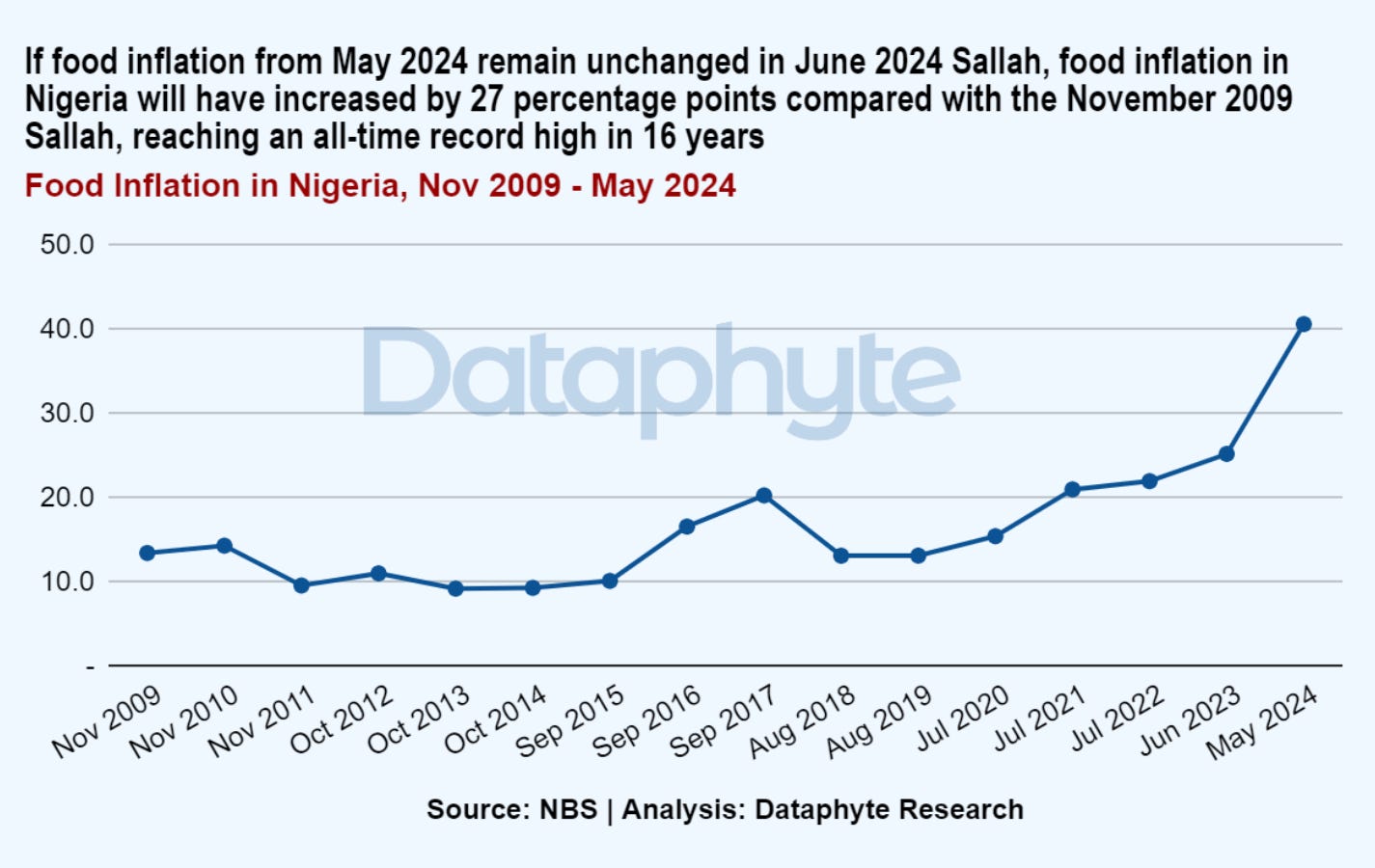This Sallah, Nigerians paid the highest prices for food and other items compared to other Sallah festivals in 16 years due to the surge in food prices and increased inflation.
Nigerians paid 9 times more for food compared to the November 2009 Sallah celebration.
Muslims in Nigeria and all over the world celebrated Sallah on the 16th of June, 2024. With celebrations marked by the sacrifice of rams and widespread festivity. Families come together to share meals, exchange gifts, and engage in communal prayers.
This hints at the possibility of Nigerians bearing the most expensive Christmas this December if the inflation rate continues to rise.
In the last 16 years, food inflation and food prices have soared to record highs, including the cost of rams.
Although CPI data for June 2024 is not yet available, the May 2024 CPI is the most reliable indicator for forecasting the inflation rate and food prices for the Sallah celebration in June 2024, due to the inherent connection between monthly figures.
Now, let’s assume the inflation rate and average food prices in May 2024 remain unchanged in June 2024.
That means between the Sallah celebrations in 2009 and 2024, the food inflation in Nigeria will have increased by 27 percentage points from 13.5% in 2009 to 40.66% in May 2024, marking the highest inflation rate the country has experienced within this period.
Also, the average food price in May 2024 saw an alarming 820% increase, rising from N99.9 to N920.
This suggests that an average Muslim family may have struggled to afford food and other essentials for the June 2024 Sallah celebration.
Sallah is renowned for its signature dishes, highlighted by succulent mutton steaks, rice, and local meals like Amala, Semo, etc.
As such, high quantities of rams, rice, and other essential ingredients are on demand during the period.
Similarly, the price of ram has soared compared to what it used to be last year. In several interviews conducted by Premium Times, many Nigerians expressed their frustration, noting that prices of ram had increased significantly compared to last year.
This ongoing trend of escalating food prices and inflation signals a severe cost of food crisis during Christmas 2024 and beyond, which may deprive people of the luxury of fulfilling their religious obligations and diminish the sense of community that these festivals bring.
Sallah: Like Last Christmas
The unprecedented food inflation rate that tainted the 2024 Sallah celebrations is not an isolated case.
It is just like the last Christmas when Nigerians spent more on food because of unprecedented food inflation.
Given the continuous rise in the inflation rate since January 2024, this year's Christmas could surpass last year's as the most expensive yet.
Christmas: Lessons from Sallah
According to economists, the primary responsibility for controlling inflationary pressures on households and firms rests with the government.
However, individuals can adopt smart pocket strategies to navigate the ongoing economic crisis in the country.
We gathered lessons on how some Muslim faithfuls managed to alleviate the impact of high food prices during the 2024 Sallah celebrations.
First is the idea of cutting one’s coat not according to one’s body size but according to the cloth size, celebrating the festival with the resources at hand.
According to a Professor of Islamic Studies at Hikmah University in Kwara State, Lateef Oladimeji, affordability is an essential thing people can consider during the Sallah Celebration. He emphasised that if the cost of ram is too high and some Muslims cannot afford it, it doesn’t affect their celebration.
Another way to reduce inflationary shocks on festivals is initiating a special savings plan towards buying ram for Sallah. This is what Mohammed Bashir, who was interviewed at Kugbo Ram Market in Abuja, did.
He said his family had saved towards getting a big ram during Sallah since buying a ram is a yearly tradition for his household. This helped in purchasing a ram despite the inflated prices.
Lastly, some individuals opted to purchase smaller, more affordable rams or chose alternative meats such as camel and cow, which could be shared among many people to reduce costs and expenses.
What do they say about learning from experience?
Well, insights gathered from the experience of Muslim faithfuls this Sallah may be valuable for coping with inflationary shocks in like future festivals.
And Christmas is just 6 months away!
Thanks for reading this edition of Pocket Science. It was written by Funmilayo Babatunde and edited by Oluseyi Olufemi.






